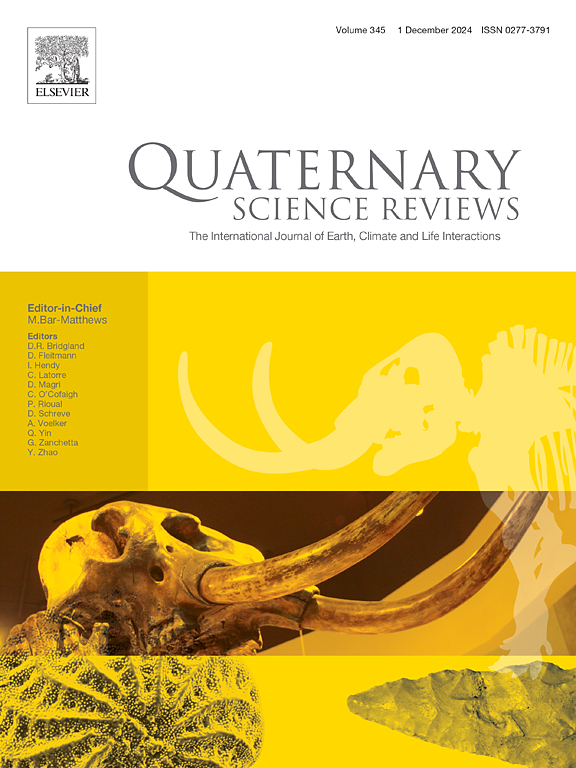来自 Castiglione maar 的高分辨率沉积物记录揭示了意大利中部科利阿尔巴尼最近火山活动的时间并揭开了隐秘喷发的面纱
IF 3.2
1区 地球科学
Q1 GEOGRAPHY, PHYSICAL
引用次数: 0
摘要
最近的研究证明,整合连续沉积档案中的近端和中-远端表壳记录,对于获得更完整、更清晰的爆炸活动地层和年代学历史,从而对火山灾害进行详细、准确的评估至关重要。罗马以东约 20 千米处的卡斯蒂利昂火山口的沉积演替拥有可追溯到约 365 ka 年的漫长而连续的湖沼记录,其中包括泰勒瑞尼亚周边火山中心爆炸活动产生的大量表壳层。对卡斯蒂利昂复合断面 11 米至 15 米深度之间的六个表土层进行了综合表土年代学调查,结合了地层学、质地学、矿物学、地球化学和 40Ar/39Ar 地球年代学分析。该剖面记录了科利阿尔巴尼火山最近的爆炸活动历史,并与阿尔巴诺火山口有关。研究结果表明,阿尔巴诺火山历史实际上包括六次爆炸活动,这些活动比以前认为的要年轻,发生的时间间隔也较窄。具体地说,对六块表皮岩中的四块测定的 40Ar/39Ar 年龄以及对其余两块表皮岩测定的模拟年龄表明,阿尔巴诺火山最后一个子周期的喷发活动持续了 3.4 +0.4/-0.6 ka,发生在 37.71 ± 0.34 ka(第一次喷发的 40Ar/39Ar 年龄)和 34.34 +0.25/-0.45 ka(最后一次喷发的模拟年龄)之间。研究结果完善了科利阿尔巴尼火山最近一次爆发活动的历史,并强调了研究保存在中纵向连续沉积档案中的火山灰对全面重建火山爆发历史的重要性。根据收集到的数据,之前未被确认的爆炸性喷发可能属于中等规模,但足以产生高度破碎和广泛分散的火山灰。我们认为,在对阿尔巴尼火山地区进行最新的长期危害评估时,应考虑这些新发现。研究结果,尤其是新的高精度年龄,还有助于改进阿尔巴诺火山碎屑散布地区的风化年代学框架,包括蒙蒂奇奥和富奇诺的标志性古气候档案。本文章由计算机程序翻译,如有差异,请以英文原文为准。
A high-resolution tephra record from Castiglione maar reveals the timing and unveils cryptic eruptions over the most recent volcanic activity at Colli Albani, central Italy
Integrating proximal and medial-distal tephra records from continuous sedimentary archives has recently proven to be crucial for obtaining more complete and highly resolved stratigraphic and chronological histories of explosive activity, allowing a detailed and accurate assessment of volcanic hazards. The sedimentary succession from the Castiglione maar, about 20 km east of Rome, hosts a long and continuous lacustrine record extending back to ca. 365 ka, including a number of tephra layers derived from the explosive activity of peri-Tyrrhenian volcanic centres. An integrated tephrochronological investigation, which combines stratigraphic, textural, mineralogical, geochemical and 40Ar/39Ar geochronological analyses, was conducted on six tephra layers occurred between 11 and 15 m-depth of the Castiglione composite section. This section records the history of the most recent explosive activity of the Colli Albani volcano and relates to the Albano maar. Results reveal that the Albano maar volcanic history actually comprises six explosive events that are younger than previously thought and occurred in a narrower time interval. Specifically, 40Ar/39Ar ages determined on four of the six tephra, along with the modelled ages for the remaining two, indicate that the eruptive activity of the last sub-cycle of the Albano maar lasted 3.4 +0.4/-0.6 ka, and occurred between 37.71 ± 0.34 ka (40Ar/39Ar age of the first eruption) and 34.34 +0.25/-0.45 ka (modelled age of the last eruption). Results refine the history of the most recent explosive activity at Colli Albani volcano and underscore the importance of studying tephra preserved in medial-distal continuous sedimentary archives for a comprehensive reconstruction of the eruptive history. Based on the data collected, the previously unrecognised explosive eruptions were likely of medium magnitude but sufficiently large to produce highly fragmented and widely dispersed ash. We argue that these new findings should be considered for an updated long-term hazard assessment of the Colli Albani volcanic area. Results, and especially the new high-precision ages, also allow to improve the tephrochronological framework in the dispersal area of the Albano tephra, including the iconic paleoclimatic archives of Monticchio and Fucino.
求助全文
通过发布文献求助,成功后即可免费获取论文全文。
去求助
来源期刊

Quaternary Science Reviews
地学-地球科学综合
CiteScore
7.50
自引率
15.00%
发文量
388
审稿时长
3 months
期刊介绍:
Quaternary Science Reviews caters for all aspects of Quaternary science, and includes, for example, geology, geomorphology, geography, archaeology, soil science, palaeobotany, palaeontology, palaeoclimatology and the full range of applicable dating methods. The dividing line between what constitutes the review paper and one which contains new original data is not easy to establish, so QSR also publishes papers with new data especially if these perform a review function. All the Quaternary sciences are changing rapidly and subject to re-evaluation as the pace of discovery quickens; thus the diverse but comprehensive role of Quaternary Science Reviews keeps readers abreast of the wider issues relating to new developments in the field.
 求助内容:
求助内容: 应助结果提醒方式:
应助结果提醒方式:


